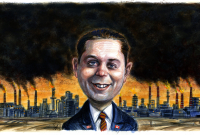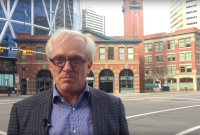Support strong Canadian climate journalism for 2025
The Greta has landed. Let’s hope Jason Kenney’s quixotic fever dreams of a battle against the future don’t materialize as well.
Even before Greta herself arrived in Alberta, when it was just Greta-inspired climate strikes that had come to the province, the Kenney government’s response was to gloatingly paste "I Love Oil and Gas" posters on the legislature windows, mooning the striking students in a move more childish than anything coming from the earnest teenagers below.
And when Greta announced that she, herself, would visit Alberta, Kenney’s government began issuing smug missives: the climate oracle should make her next visit to oil-producing "dictatorships" like Saudi Arabia.
Then she’d learn about "Alberta’s leading human rights and environmental standards" and that our fossil fuels are much better than theirs.
The tortured logic seems to be that, because Alberta doesn’t carry out stoning or saw the limbs from pesky journalists, climate change doesn’t matter.
The argument behind ethical oil has been pumped out by Rebel Media, the oil industry’s attack dogs at CAPP and Postmedia. But it’s never been clear just what audience these arguments are intended to sway.
“At least we don’t dismember our critics” wouldn’t be the first message you’d pick to win over the growing majority of the world increasingly panicked about tepid government response to looming catastrophe.
The bonesaw argument is certainly not going to sway the emerging generation of kids who are taking their lives into their own hands and have galvanized global protests unlike anything the planet has ever seen.
Greta may have missed a lot of school but she is unlikely to be moved by politicians from one of the planet’s most fortunate countries insisting we should be graded on a curve, against the worst petro-regimes in the world.
Part of Greta’s transcending power is that she so piercingly articulates the big picture. The house is on fire and anyone still throwing fossil fuel on the flames is guilty, at best, of child endangerment and, probably, of much worse.
Right there is where Alberta has a big problem. It’s not just that the oilsands exist —so do many other fossil fuel projects around the world. It’s that Canada is already the fifth-largest oil producer in the world and is enthusiastically, massively expanding the size of fossil projects. Right at this moment, Alberta is actively preparing to add its largest oilsands mine ever, Teck Resources’ Frontier project (rolling over the opposition of First Nations and siting the project right next to Wood Buffalo National Park).
The fossil fuel industry can try its best to school Greta on its technological innovations in the oil and gas sector. Others will rightly point out that the Alberta isn’t just fossil fuels — the province also has admirable clean energy projects.
These arguments will be hard to hear above the still-groaning wreckage of Alberta’s recent climate policies. Kenney promised to tear up Alberta’s climate progress on Day 1 of his new government. He kept his promise. Gleefully.
Kenney didn’t just take an immediate wrecking ball to climate policy (even Easterners like Doug Ford can do that); he launched the province into all-out war with environmentalists. Thirty million dollars for a “war room” (yes, unbelievably, Kenney’s own words) to take the evil greenies to a kangaroo court and pay to advertise the bonesaw argument across the country and around the world.
Alberta is now spending more dollars fighting people concerned about climate change than it spends on monitoring the toxic effluent and air pollution from oil extraction.
The irony of Kenney’s great unravelling is that the broad international campaigns against the oilsands had been shrinking for several years. There were several reasons: Alberta had taken significant climate steps and was no longer seen as an unrestrained climate pariah; the oilsands were being dwarfed by the shale boom in the U.S. and, of course, by Donald Trump exuberantly donning the mantle of world climate villain.
Local campaigns against the Trans Mountain pipeline expansion continued but now the pipeline itself was owned by the federal government and the courts were adjudicating the human rights issues and consultation process for impacted First Nations. Other pipeline projects were moving along, having slipped entirely from the public radar.
This could have been a moment to take stock. To think clearly about the formidable challenges facing any government sitting on reserves of oil, gas or coal. It still could be.
Barely a week seems to go by without another international financial giant exiting the oilsands. Without another record-setting low price for green energy, for batteries or other clean tech. Without another government committing to take its jurisdiction to zero carbon, ban coal or phase out gasoline cars or natural gas.
And each week the weather gets crazier. Another hundred-year storm coming mere months on the heels of the previous. Floods drowning entire regions. Fires incinerating seniors as they race to evacuate.
Governments with fossil fuel reserves, no matter where on the planet, need clear eyes and open minds to navigate the daunting challenges ahead. We need strategies to support workers now working in coal, oil and gas. Preparation for the known climate impacts bearing down on our cities and communities. We need innovative thinking to create economies that can thrive into the future.
And maybe, hopefully, inexplicably, it will be an otherworldly teenager that prompts the adults to get serious.







Comments
The AB Govt's "ethical oil" argument is obviously fallacious. Nor does it hold up to scrutiny on the evidence.
Would tobacco, asbestos, or landmines made in Canada be ethical?
"Ethical" isn't a relative term. "Ethical" doesn't mean "better than Saudi Arabia". Being better than Stalin doesn't make you a saint.
Is missing our emissions targets by a mile and breaking int'l climate commitments ethical?
The people who complain about Saudi oil imports have nothing to say when it comes to selling military vehicles to the Saudis, now waging a murderous war in Yemen.
And they're fine with selling our oil to China despite its dismal human rights record.
The Saudi spiel is an argument of convenience.
Human rights violations in the oilsands... Where to start?
Rampant pollution and dire health issues for First Nations communities in the oilsands region. Is it "ethical" to poison our fellow Albertans?
"Since November 2011, water has been delivered to each and every home in Fort McKay after the community realized they had been drinking water with high levels of the carcinogenic chemicals, trihalomethanes and haloacetic acids. Many people complain of rashes and sores from showering in the water.
"Cancer, miscarriage and respiratory illnesses are frequently reported in Fort McKay. Many believe industry is to blame."
"It devours our land" (The Narwhal)
• https://thenarwhal.ca/it-devours-our-land/
"How Alberta kept Fort McKay First Nation in the dark about a toxic cloud from the oilsands" (National Observer, Apr 8th 2019)
• https://www.nationalobserver.com/2019/04/08/news/how-alberta-kept-fort-…
Industry and govt are running out the clock on AB's endangered caribou herds, while shooting and poisoning wolves, with untold collateral damage:
"Unethical Oil: Why Is Canada Killing Wolves and Muzzling Scientists To Protect Tar Sands Interests?
"In the latest and perhaps most astonishing display of the tar sands industry’s attacks on science and our democracy, the government of Alberta has made plans to initiate a large-scale wolf slaughter to provide cover for the destruction wrought by the industrialization of the boreal forest ecosystem.
"In the coming years, an anticipated 6,000 wolves will be gunned down from helicopters above, or killed by poison strychnine bait planted deep in the forest. Biologists and other experts say the cull is misguided, and that their studies have been ignored or suppressed. Worse, they warn that although the government is framing the wolf cull as a temporary measure, it has no foreseeable end." (Desmogblog 2012)
• https://www.desmogblog.com/unethical-oil-why-canada-killing-wolves-and-…
Thank you Jeffery. and then there is the $260 Billion fossil fuel clean up costs in Alberta and those costs do not include the acidification of 300,000 square kilometers of air, land and water, an area the size of Germany. Our own Canadian and Alberta scientists are warning us about this. Quote: The largest and most precise study yet done on acid emissions from Alberta’s oilsands suggests they could eventually damage an area almost the size of Germany.
The study finds that in 2013 more than 330,000 square kilometres in northern Alberta and Saskatchewan absorbed acid deposits high enough to eventually damage life in rivers and lakes. “This work is a warning,” said Paul Makar, an Environment Canada scientist and lead author on the paper published in the Journal of Atmospheric Chemistry and Physics. https://ipolitics.ca/2018/07/25/oilsands-could-eventually-acidify-area-…
Amen. And thank you for repeating some points for new readers, the overriding part not mentioned being that there are no agreements anywhere to purchase dilbit -- not to mention that even refining it in place would make it still more expensive for foreign purchase than oil from other sources: i.e., there *is* *no* *demand* for that oil!!!
I find it particularly curious that some Albertans seem to think the rest of Canada is "ganging up on them" and not understand that the rest of Canada is becoming frustrated that all their efforts toward reducing emission, paid for by individuals, companies and taxpayers from all three levels of government, are being sacrificed because Alberta Oil (not that they're any different from, say, American Oil) is oblivious to the facts.
Kenney, Ford and Sheer -- All Lies, All The Time. And then, there's Trudeau, who's still lying through his teeth about current levels and reductions -- and after the Lavillin affair, it's pretty difficult to believe that he's merely mistaken.
The Elections Act needs to be amended, first to disqualify candidates who over-spend, second to remove the provisions for third-party advertising that shield donors' identities, and third, to have the same kind of (at least theoretical) requirement for truth as in advertising and media. And heaven knows those need a lot of beefing up.
Without those, it's all money talking ... and the talk is largely lies.
For people like Kenny, fossile fuel has become a religion and crusades being launged for its salvation are on the march. Many of those people don't know about the Children's Crusade European charistian zealots sent trekking across the Continent to "save" Jerusalem from the Muslim hordes. That Crusade, like most of the others, foundered in the Middle Eastern deserts with only rare survivors returning to Europe to relate the story.
The moral? Children cannot change the world, if they do not survive. The adults on this planet are in charge of our future, but seem too stupid to realize it.
Awesome comparison. Thank you!
Kenny's inadvertently right - the "ethical oil" thing certainly has some merit, given the cholera epidemic in Yemen, but the real reason to prioritize Saudi Arabia is that they are the best pressure point to raise the price of oil and thus restrict consumption.
Oil dropped from $140/bbl to $40/bbl in a matter of months, because Mohammed bin Salman opened the taps wide in an effort to drive the frackers broke by crashing their profits. Alas, most of the frackers held on with economies and improved tech and some deep pockets behind them - the worst-hit victims were Albertans. Why they do not loathe MbS for this and instead blame environmentalists is the real mystery.
Closing off Alberta oil would not ensure that the same amount was never consumed; that's economically insane. It would just drive up the global price by a few percent, restricting consumption not at all. It would, quite literally, do no measurable climate good.
Whereas a global boycott of Saudi oil would shoot the price up above $140/bbl and ring in a whole new economic environment that made electric vehicles a huge economic win for the consumer. I know I'm dreaming with "global", but if even the industrial democracies boycotted them, the price would rise very sharply, probably back up above $100.
Even a stopped clock is right twice a day, and Kenny just happens to have picked the right villain that's worse than, well, him.
I think that Saudi Arabia getting blamed for starting the world glut in oil is an inaccurate assertion. The glut started with the U.S. shale plays going at full bore for several years.
There are two reasons for this:
One, American shale functions on high debt levels and low profitability. This came about in part from investment bankers hyping the plays to the sky with lots of suckers believing the impossible return projections and therein willing to part with their money. The signs are they are getting wise and are staying away. That means bankruptcies and a slowdown in production down south.
Two, the well production rates in shale are greatly constrained by geological constraints that result in extraordinary decline rates, some as high as 90% after the first year, with the average industry-wide decline at 53%. This necessitates more drilling, more expense, more production, more stockpiles and more debt just to maintain a steady production level before it drops suddenly. A vicious cycle. Two of the five major shale formations are already in decline or are on a production plateau. You can thank independent analysts David Hughes and Arthur Berman for this research.
Alberta contributed to this scenario with its own huge over-production and sales to the U.S. Gulf Coast refiners and buyers for 10-15 years. In essence, the U.S. and Alberta created the glut and started the price slide by providing too much supply. Saudi Arabia and Russia merely kept their spigots open for months (likely with smirks on their faces) until the basement price started to hurt them too.
In several respects Alberta is the author of its own misfortune. Over-production in oil at the wrong time and lack of courage to fully address its lack of economic diversity and environmental liabilities are two of the biggies. Blaming everybody else is standard practice (BC, Trudeau, environmentalists, moon cycles ...), and that will continue. Now we have the politics of division practiced by Jason Kenney, a narrative that could bounce off a brick wall should a progressive, climate fighting coalition government evolve from Monday's federal election.
When faced with uncertainty and insecurity, it's the Albertan way to lash out. We should be prepared for a lot of noise.
Climate change induced by greenhouse gases produced by people is real and very alarming. But alarmist articles without citations is as futile as the arguments against the reality of climate change. Critical readers will just roll their eyes when they read this one.
Alarmist? Which part of the article do you find to be alarmist? :)
May I humbly suggest that perhaps you are not frightened enough? If you wish annotation, this article might be worth a quick read -http://nymag.com/intelligencer/2017/07/climate-change-earth-too-hot-for…
I can understand your point about citations. There are some links in there but were there other points in particular where you'd suggest I provide references?